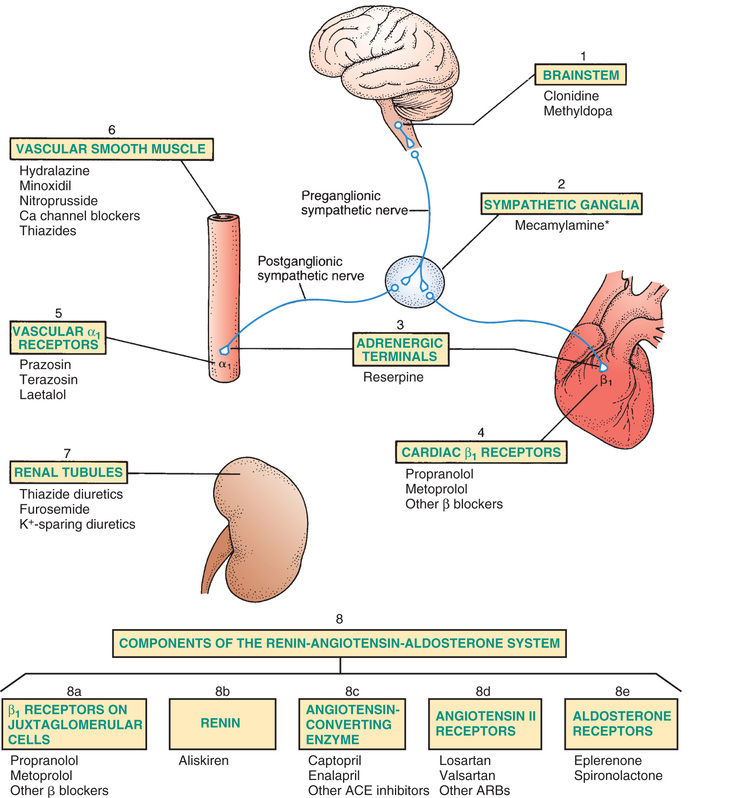What are the 10 best blood pressure tablets?
We will now go through what are the 10 best blood pressure tablets.
1. ACE inhibitors (ACEs)
ACE (Angiotensin-converting enzyme) inhibitors help to control hormones that play a role in blood pressure control.
They cause the blood vessels to relax and widen, lowering blood pressure. Most have names that end in ‘pril’, for example, enalapril, lisinopril, perindopril and ramipril.
2. Angiotensin receptor blockers (ARBs)
These work in a similar way to ACE inhibitors, controlling the hormones that affect blood pressure; but you should not take ACE inhibitors and ARBs at the same time.
They are mainly usually used if ACE inhibitors are causing side effects. Most have names that end in ‘sartan’; for example, candesartan, irbesartan, losartan, valsartan and olmesartan.
 Mechanism of action
Mechanism of action
3. Calcium-channel blockers (CCBs)
These allow the artery walls to relax, making them wider. This allows more blood to pass through, lowering blood pressure. Most have names that end in ‘pine’ (pronounced, peen), for example, amlodipine, felodipine and nifedipine.
4. Thiazide diuretics
These are sometimes known as ‘water tablets’ because they remove excess fluid from the body, including from the blood. This means there is less pressure on the blood vessel walls. Most have names that end in ‘ide’, for example, indapamide and bendroflumethiazide.
5. Loop diuretics
E.g. furosemide and bumetanide. Another type of water tablet.
6. Beta blockers
Beta-blockers are no longer usually used for blood pressure treatment alone. This is because they have been found to be less effective in preventing strokes and heart attacks than other medication choices.
However, sometimes they may be used where there are other conditions present, such as heart failure or atrial fibrillation.
They work by slowing the heart rate, and reducing the force of the heart. Examples include bisoprolol, atenolol, metoprolol, propranolol and labetolol (used alot in pregnancy).
7. Alpha blockers
E.g. doxazosin.
8. Centrally acting antihypertensive drugs (central alpha antagonists)
E.g. methyldopa (used alot in pregnancy).
9. Other vasodilators
E.g. hydralazine and minoxidil (latter is very strong, and should only be prescribed by hospital specialists).
10. Renin inhibitors
E.g. aliskerin (a newish group of drugs).
What about side-effects?
All medicines have possible side-effects, and no medicine is without risk. However, most people who take medicines to lower blood pressure do not develop any side-effects, or only have mild side-effects. A full list of cautions and possible side-effects is listed on the leaflet inside the medicine packet. The most common ones are:
- ACE inhibitors – sometimes cause an irritating cough. An ARB is then an alternative
- Calcium-channel blockers – sometimes cause dizziness, facial flushing and swollen ankles
- ‘Water’ tablets (diuretics) – can cause gout, or can make gout worse if you already have gout
- Beta-blockers – can cause cool hands and feet, and tiredness in some users.
Summary
We have described what are the 10 best blood pressure tablets. We hope you understand them better now.
Last Reviewed on 13 May 2024
